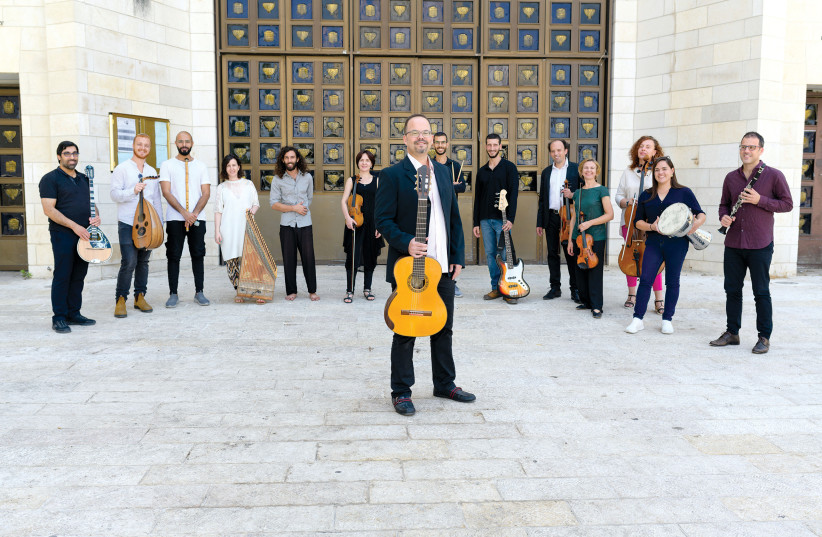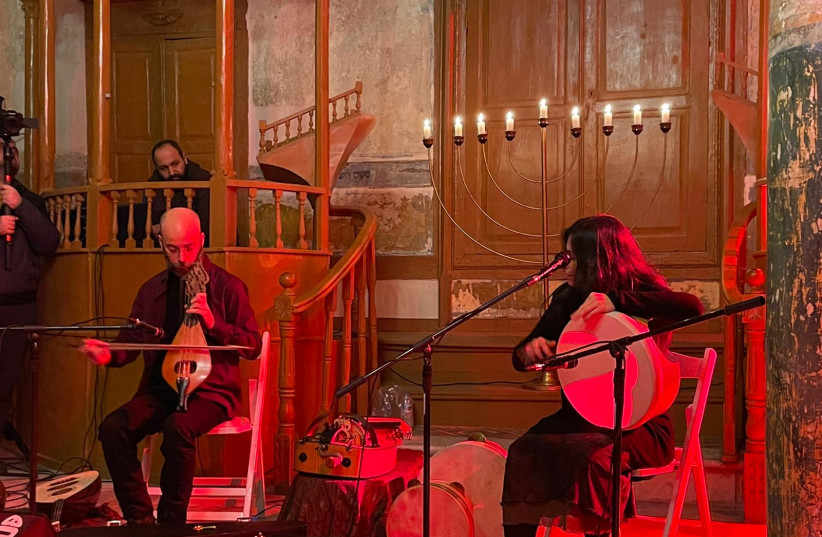If American-born Jewish modernist writer Gertrude Stein would have had a penchant for, say, ethnic music, she may very well have contended that “Ladino music is Ladino music is Ladino music.” That twist on her ubiquitous quote “a rose is a rose is a rose is a rose” which, admittedly, would be stretching the cross-disciplinary stretch a little far, would not have sat well with Dr. Ariel Lazarus.
Lazarus is a musician and academic who has delved deep into the nethermost layers of Ladino music, with particular emphasis on the sounds and textures that have emanated from the Jewish community of Gibraltar over the centuries.
That social-cultural bedrock forms the basis of his forthcoming concert at the annual Jewish Music Days Festival which takes place for the 12th time at Bar Ilan University, under the stewardship of founder perennial artistic director Dr. Yuval Rabin, May 27-29. The festival program also takes in Jewish scores from Greece, other regions of Europe, North Africa, and this part of the world. The latter includes a rare performance of the Harp Quartet by 20th-century Lithuanian-born Israeli composer Marc Lavry, who merged elements of oriental Jewish and Arab music with modern European classical music.
Heritage conservation
On May 27 (8:30 p.m.) Lazarus will share the stage with 10 instrumentalists and vocalist Shir Yifrach from the Israeli Ladino Orchestra he founded with the support of the Renanot Institute for Jewish Music in Jerusalem as they present a program of songs that feed off the Haketia linguistic and cultural tradition that developed from the Jewish communities of North Africa, including Tetouan, Tangier, Asilah, Larache, Chefchaouen, and Ksar el-Kebir, as well as the autonomous African-mainland Spanish towns of Ceuta and Melilla. Some of the folks from those towns, whose ancestors were expelled from Spain, eventually made their way across the straits to Gibraltar, one of the descendants of whom was Lazarus’s grandmother, who recently passed away at the grand old age of 99.
The guitarist-band leader does his utmost to preserve the roots of the music but is equally keen to ensure he and his colleagues in musical arms present the material in a contemporaneously compatible manner.
“Tradition is something that evolves,” he states. That figures by definition.
“Each generation adds its own layer. My own grandfather, who was a cantor in the Gibraltar community for 70 years, sang the Portuguese melodies the way they sing them in the Bevis Marks [Spanish and Portuguese] Synagogue in London and the [Portuguese] Esnoga Synagogue in Amsterdam. But he introduced something of his own.”
Therein, for Lazarus, lies the secret of longevity. “That is what keeps the tradition alive. It isn’t a work by Beethoven which has to be rendered exactly the same each time. Yes, there are interpretations of classical music but there is a written score.”

Lazarus is of the opinion that committing music to paper does not necessarily do traditional fare any favors.
“[Israeli musicologist] Edwin Seroussi calls that ‘an historic accident.’ He says it loses a lot of things, like quarter-tones and lots of things. There are people who engage in preservation, or what they think is preservation, of the material as close as possible to the original version. And there are others, like me, who are excited by the bond between the roots and contemporary expression. I afford full respect, and room, to the origin. By the simple fact that I perform the music, I ensure that it is not forgotten.”
As far as Lazarus is concerned, that also involves proffering the music to today’s audience in a form that appeals to them. “I don’t want the music to be forgotten, but I also want it to remain relevant,” he adds.
He provides me with an attractive case in point. “We perform a song called “Al pasar por Casablanca,” (“Passing through Casablanca”) a Haketia song from the 19th century.” It tells a tale with a mighty twist. “It talks about a knight; he sees a young woman in the Muslim quarter of Casablanca. He falls in love with her and she tells him that she is not a Muslim, that she is a Christian who was kidnapped as a young girl.” There’s more. “He takes her on his horse and, while they ride, and he thinks he is bringing his bride home to his village it transpires that she is his sister who was kidnapped.” Lazarus notes the unfortunate relevance of the storyline to recent horrific events here. “The kidnapping and all that – that is sadly relevant for our times too.”
THE CONCERT program also features a song written by Lazarus, called “Yagel.” The Hebrew lyrics feed off the events, and aftermath, of October 7, and include such sorrowful lines as: “Our fields are plowed with sadness. And the first rain blends with our tears.” The song concludes with hope for, and belief in, a brighter future in there too: “Give us the power to sing a new prayer. That will illuminate your grace. And I always trust in your grace. Rejoice, rejoice in your grace.”
“The two piyutim were written in the spirit of this time,” Lazarus explains. “Yagel is a prayer for a child, that he does not lose his faith that there can be good in this world.”

The second new work is based on words written by MK Michael Biton, dedicated to the memory of IDF soldiers who have fallen in the Gaza war to date. “Michael Biton is a wonderful poet,” Lazarus remarks.
The guitarist-composer believes that traditions also evolve through interacting with other sources and cultures.
“I am half Sephardic and half Ashkenazi. I am half Gibraltarian and half yekke,” he laughs. The mutually enriching crossover also runs through the ensemble.
“We use authentic eastern and western classical instruments. We have Marina Toshich, who was born in Sarajevo, on oud, and the vocalist Shir Yifrach is wonderful. She is one of the most promising voices for the future of Israeli music. She specializes in paytanut (liturgical) singing. There are very few youngsters who do that.” Hope, indeed, springs eternal.
Elsewhere in the program, there is a slot on music from Salonika; a panel discussion focusing on Israeli music in the wake of October 7; and a klezmer trio and soloists of the Jerusalem Symphony Orchestra (JSO) performing works by 20th-century French composers Maurice Ravel and Darius Milhaud, Hungarian-born Israeli composer and ethnomusicologist Andre Hajdu, and two scores by Lavry – marking the 120th anniversary of his birth.
Artistic director Rabin says the emphasis in the festival is very much on togetherness, getting to know others who are different from us, listening, and the importance of mutual empowerment. “That is so important in Judaism,” he says.
“Unity is not uniformity,” he adds. “There is room for everyone.”
For tickets and more information: (03) 731-6561 and goshow.co.il/pages/minisite/232
